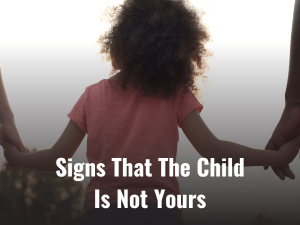Discovering that the child you’ve been raising might not be biologically yours can be a heart-wrenching revelation. While the concept may seem like a plot from a dramatic film, it’s a real-life scenario that can lead to complex emotions and challenging decisions.
In this blog, we delve into the subtle signs that might indicate your child is not genetically related to you, exploring the importance of communication, understanding, and compassion in navigating such a delicate situation.

Also check – Questions To Ask A Childminder / How To Deal With Ziddi Child
Signs that the child is not yours
1. **Physical Dissimilarities:** One of the most apparent signs is when the child bears minimal physical resemblance to you or your immediate family members. While not all children inherit the same physical traits as their parents, a stark contrast in features, such as eye color, hair texture, facial structure, or height, may raise suspicions.
2. **Blood Type Inconsistencies:** A significant indicator of possible non-paternity is a discrepancy in blood types between the alleged father, mother, and the child. Blood type incompatibility can occur if the child has a blood type that cannot be produced from the parents’ combined genetic information.
3. **Family Medical History:** A thorough analysis of the child’s medical history, including hereditary conditions and illnesses, can sometimes raise questions if there’s no evidence of such conditions in your family lineage.
4. **Unexplained Ancestry DNA Results:** In the age of consumer genetic testing, individuals sometimes take at-home DNA tests out of curiosity. If you’ve taken one of these tests and your child’s genetic heritage doesn’t align with your own, it could be cause for concern.
5. **Behavioral or Personality Contrasts:** Sometimes, personality traits or interests of the child can be vastly different from those of the supposed parents. While environment and upbringing play a significant role in shaping a child’s personality, extreme differences might spark doubts.
6. **Whispers and Rumors:** Family and friends may unintentionally or maliciously fuel suspicions by making offhand comments or gossiping about the child’s parentage. While rumors should be treated with caution, they can sometimes be the catalyst for seeking answers.
7. **Secretive Behavior or Reactions:** If you’ve ever raised questions about your child’s parentage, you might notice your partner reacting defensively or avoiding discussions altogether. Secrecy, reluctance to engage in conversations about the child’s origins, or sudden changes in behavior may be signs that something is amiss.
8. **Timing of Conception:** Paying attention to the timing of the child’s conception in relation to significant events in your relationship can be revealing. An unexpected pregnancy around the time of a partner’s absence or infidelity might prompt doubts about paternity.
9. **Sudden Distance in the Relationship:** Discovering that a child might not be biologically yours can put an immense strain on a relationship. If you observe sudden emotional distance, tension, or a decline in intimacy between you and your partner, it may be an indication of deeper underlying issues.
10. **Lack of Attachment:** While bonding experiences can differ from one parent to another, a persistent lack of attachment from the child towards the supposed father may raise concerns. However, it’s essential to remember that attachment can be influenced by various factors and should not be solely relied upon as evidence.
11. **Legal and Financial Secrecy:** If you notice your partner being secretive about financial matters or exhibiting unusual behavior with legal documents related to the child, it could warrant further investigation.
12. **Surprising Revelation by Others:** Occasionally, someone outside the immediate family might come forward with information or evidence that suggests the child’s parentage is different from what was assumed. While such revelations should be handled carefully, they might prompt you to seek the truth.
13. **Parentage in Extended Family:** If there have been instances of undisclosed adoptions or unknown parentages within your or your partner’s extended family, it might raise questions about your own child’s origins.
14. **Mother’s Reactions:** Pay attention to the mother’s behavior when the topic of the child’s parentage arises. If she becomes overly defensive or avoids discussions, it might indicate a deeper issue that needs to be addressed.
15. **Genetic Trait Inconsistencies:** In addition to physical appearances, inconsistencies in inherited genetic traits, such as allergies, blood disorders, or specific genetic conditions, could raise suspicions.
16. **Ancestral Knowledge Discrepancies:** If you and your partner have a deep knowledge of your respective family histories, discrepancies in ancestral knowledge mentioned by your child might prompt further investigation.
17. **Family Confessions or Hints:** In some cases, family members may inadvertently drop hints or confess to knowing about the child’s true parentage. Such statements should be approached with care and verified where possible.
18. **Doubts Raised by the Child:** As children grow older, they may hear rumors or notice discrepancies themselves, leading them to ask questions about their parentage. Honesty and sensitivity in responding to their inquiries are paramount.
19. **Unexplained Gifts or Attention:** If other individuals outside the immediate family show an unusually strong interest in the child, or if they regularly give gifts or attention without a clear reason, it might raise suspicions.
20. **Similarities with Unrelated Individuals:** Occasionally, the child may show striking similarities with someone unrelated to the family. Such resemblances, if noticed by others, might prompt discussions or questions.
In conclusion, facing the possibility that the child you’ve loved and cared for may not be biologically yours can be an emotionally tumultuous journey. It’s crucial to approach this sensitive matter with empathy, honesty, and a willingness to seek the truth. Regardless of genetic connections, the love and bond formed between a parent and child can go beyond biology. Embracing open communication and seeking professional support can aid in coping with the complexities and uncertainties, ultimately fostering a stronger family unit based on trust and understanding.
